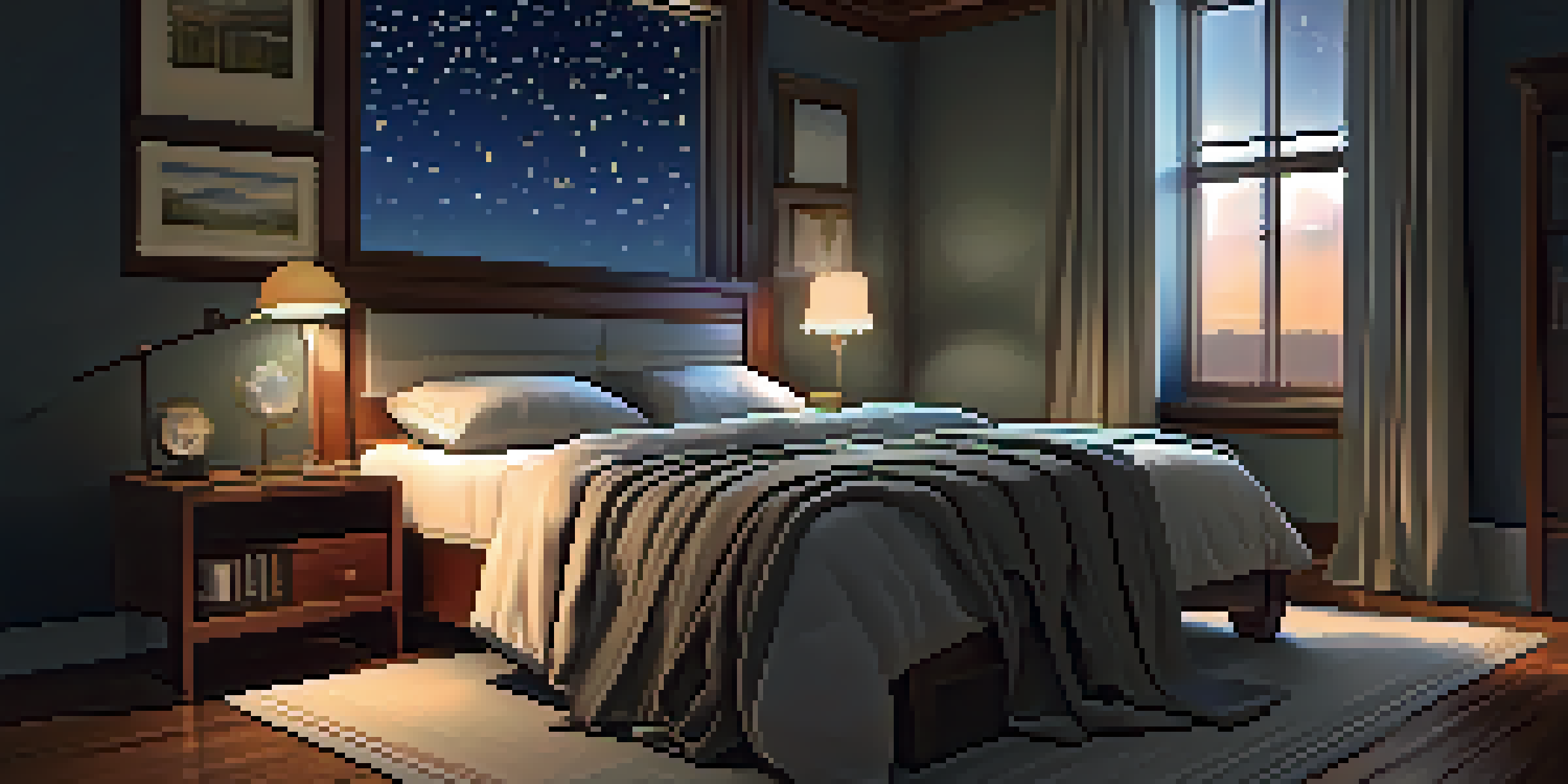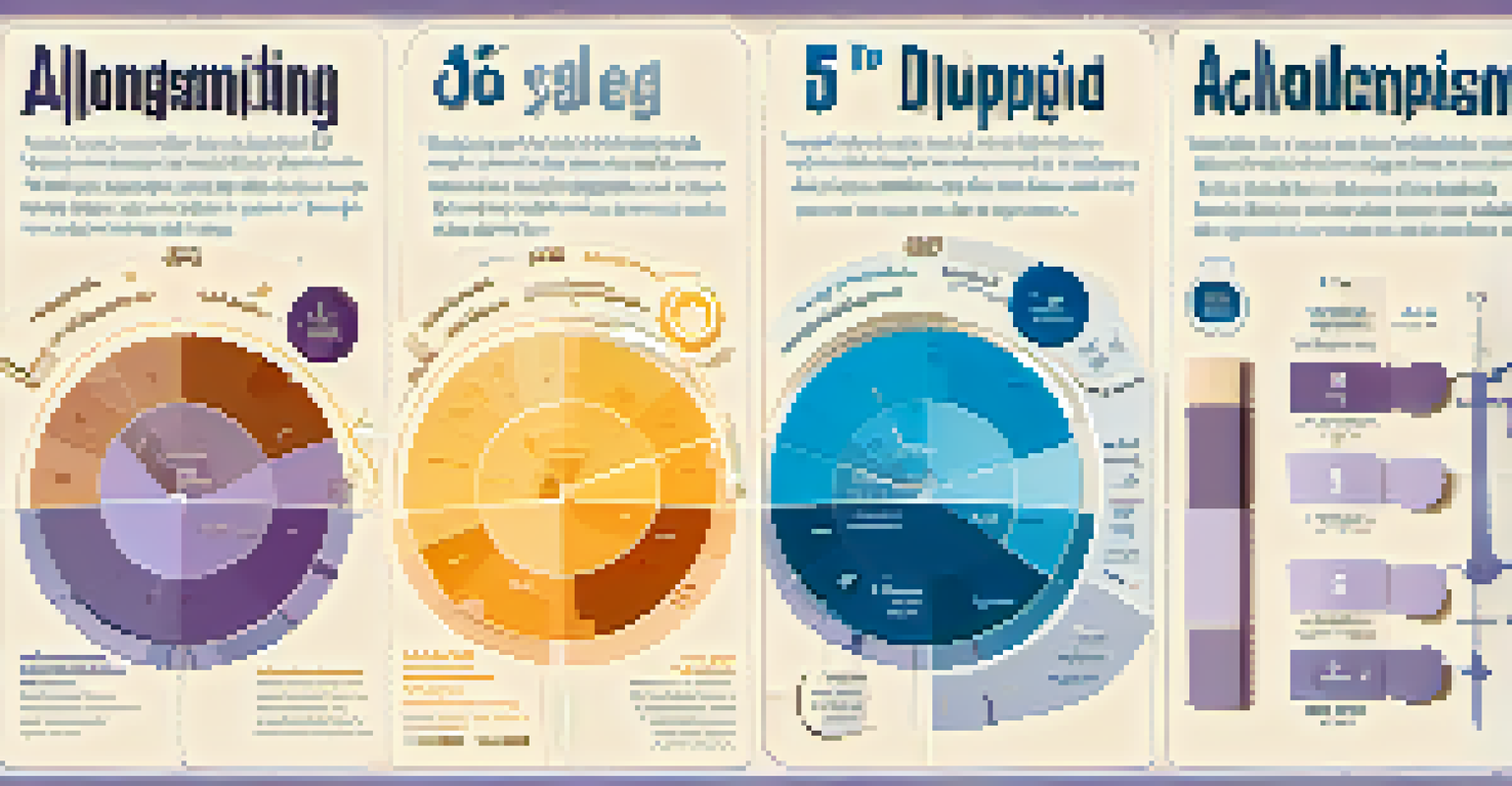The Impact of Alcohol on Sleep Quality and Disorders

Understanding the Relationship Between Alcohol and Sleep
When we think about a good night's sleep, alcohol often comes to mind as a potential aid. Many people believe that a drink can help them unwind and fall asleep faster. However, the reality is that while alcohol may initially induce sleepiness, it disrupts our sleep cycle, leading to poorer quality rest overall.
Alcohol is a double-edged sword; it can help you relax, but it can also disrupt your sleep patterns.
Alcohol affects the brain's neurotransmitters, which play a crucial role in regulating sleep patterns. This means that even if you fall asleep quickly after drinking, your body might struggle to maintain restful sleep throughout the night. It's a bit like trying to keep a balloon afloat—initially easy, but it quickly gets trickier as time goes on.
Understanding this relationship is key because many individuals aren't aware of the long-term consequences alcohol can have on their sleep. Instead of being a reliable sleep aid, it may be doing more harm than good, impacting both our physical and mental well-being.
How Alcohol Disrupts Sleep Cycles
To appreciate the impact of alcohol on sleep, it's essential to understand our sleep cycles. Typically, we cycle through different stages of sleep, including REM (Rapid Eye Movement) sleep, which is crucial for restorative processes like memory consolidation. Alcohol can disrupt these stages, particularly reducing REM sleep, which might leave you feeling groggy.

Imagine your sleep cycle as a beautifully orchestrated symphony. Each instrument has its role, and when one is out of tune, the harmony is lost. Alcohol acts like a disruptive force, throwing off the balance of this nocturnal concert, and the result is a fragmented night’s rest.
Alcohol Disrupts Sleep Quality
While alcohol may help you fall asleep faster, it ultimately leads to poorer sleep quality and frequent awakenings.
Many people wake up the next day feeling unrested and unable to focus, often attributing it to many factors without realizing that their evening drink might be the culprit. By disrupting our sleep architecture, alcohol can lead to a vicious cycle of poor sleep and increased consumption.
Short-Term Effects of Alcohol on Sleep Quality
In the short term, alcohol can lead to a faster onset of sleep, but this is often misleading. The initial sedative effects may seem beneficial, but they can quickly give way to disturbances throughout the night. Sleepers may find themselves waking up more frequently or struggling to return to sleep.
Sleep is the best meditation.
Think of it like setting a timer for a quick nap. You might fall asleep instantly, but when the timer goes off, you realize you haven't had a restful break at all. This is similar to how alcohol can trick you into thinking you’re getting quality sleep when, in fact, you’re barely resting.
As a result, many people experience increased fatigue and irritability the next day, which can affect productivity and overall mood. The short-term allure of alcohol as a sleep aid often masks the negative implications that follow.
Long-Term Consequences of Alcohol on Sleep Disorders
Over time, the cumulative effects of alcohol on sleep can lead to more serious sleep disorders, such as insomnia or sleep apnea. Regular consumption can alter sleep patterns significantly, making it difficult for the body to establish a natural rhythm. This can set the stage for chronic sleep issues.
Consider the analogy of a plant that thrives on a regular watering schedule. If you constantly disrupt its routine, it may struggle to grow properly. Similarly, when alcohol becomes a regular part of your bedtime routine, it can hinder your body’s ability to maintain healthy sleep.
Long-Term Sleep Issues from Alcohol
Regular alcohol consumption can contribute to chronic sleep disorders like insomnia and sleep apnea.
As sleep disorders develop, individuals may find themselves caught in a cycle where they rely on alcohol to combat insomnia, further exacerbating the issue. Breaking this cycle often requires a conscious effort to reduce alcohol intake and adopt healthier sleep habits.
Alcohol and Nighttime Awakening
One common effect of alcohol consumption is the tendency to wake up multiple times during the night. While many might assume this is just a natural part of sleep, alcohol can significantly increase these awakenings, leading to a restless night. This frequent disruption can prevent individuals from reaching deeper sleep stages.
Imagine trying to enjoy a movie when someone keeps changing channels. The interruptions prevent you from fully engaging with the storyline, much like how alcohol prevents you from enjoying uninterrupted sleep. These awakenings can leave you feeling frustrated and tired.
This phenomenon can be particularly concerning for individuals who already struggle with sleep issues. A night filled with interruptions can create a feeling of disarray, making it challenging to function the next day.
The Role of Alcohol in Sleep Apnea
Sleep apnea is a serious condition characterized by pauses in breathing during sleep. Alcohol can exacerbate this disorder by relaxing the throat muscles, increasing the likelihood of airway obstruction. For those who already suffer from sleep apnea, consuming alcohol can worsen symptoms and lead to more severe health issues.
Think of it like a traffic jam caused by a roadblock. When alcohol relaxes the muscles, it creates a barrier in your airway, similar to how a blockage would hinder smooth traffic flow. This can lead to fragmented sleep and decreased oxygen levels in the body.
Balance is Key with Alcohol Intake
Finding a moderate balance in alcohol consumption can help maintain healthy sleep patterns without sacrificing social enjoyment.
For anyone diagnosed with sleep apnea, understanding the risks of alcohol is crucial. By making informed choices about drinking, individuals can take proactive steps toward better sleep health and overall wellness.
Finding a Balance: Alcohol Consumption and Sleep
While some may enjoy a drink in the evening, it’s essential to find a balance that doesn’t compromise sleep quality. Moderation is key; understanding your limits can help you enjoy social settings without negatively impacting your rest. This doesn’t mean you have to completely abstain, but being mindful of intake can make a significant difference.
Think of it like enjoying dessert. A small slice can be a delightful treat, but too much can lead to an upset stomach. Similarly, a moderate amount of alcohol may not significantly impact your sleep, while excessive consumption can lead to restless nights.

By prioritizing healthy sleep habits and being mindful of alcohol consumption, you can create a lifestyle that supports both social enjoyment and restorative sleep. Finding this balance is essential for overall well-being, allowing you to thrive both during the day and at night.